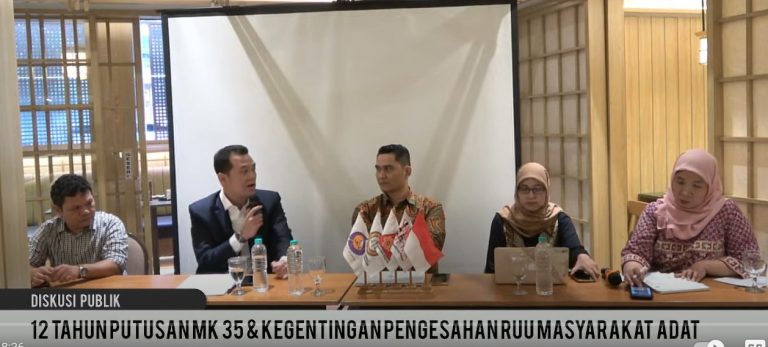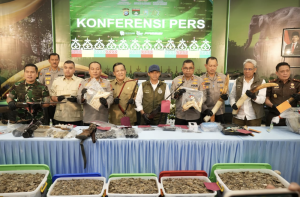Jakarta — A coalition of civil society groups, legal experts, and lawmakers is urging Indonesia’s parliament to pass the long-delayed Indigenous Peoples Bill (RUU Masyarakat Adat) immediately, citing worsening land conflicts and systemic neglect of Indigenous rights despite a landmark 2012 Constitutional Court ruling.
The Constitutional Court Decision No. 35/PUU-X/2012 (MK 35) recognised customary forests as belonging to Indigenous communities, not the state. However, more than a decade later, the government has yet to enact national legislation to implement the ruling.
“After MK 35, almost nothing has changed in the field. Agrarian conflicts persist, and Indigenous peoples remain vulnerable to intimidation and criminalisation,” said Siti Rakhma Mary from the Coalition to Monitor the Indigenous Peoples Bill, told the press on Monday, May 26. “We imagined this ruling would resolve long-standing issues, but that hope remains unmet.”
According to the Indigenous Peoples Alliance of the Archipelago (AMAN), at least 2.8 million hectares of Indigenous territories were seized in 2024—an increase from 2.5 million hectares the previous year. Meanwhile, only 14% of the 26.9 million hectares of Indigenous territories registered with the Ancestral Domain Registration Agency (BRWA) have been officially recognised.
While 342 regional regulations acknowledge Indigenous communities, the absence of a national law limits the enforceability of these regulations. “Regional bylaws are not enough,” said Erasmus Cahyadi, AMAN’s Deputy Secretary General. “National legislation is the only path to ensure legal certainty and protection.”
He also criticised the Ministry of Environment and Forestry (KLHK) for deviating from the MK 35 mandate by classifying customary forests separately from private forests, contradicting the court’s interpretation.
Lawmakers have expressed renewed political will. Martin Manurung, Deputy Chair of the House Legislative Body (Baleg), confirmed that the DPR leadership has given the green light to resume deliberations. “We need a dedicated law because Indigenous issues are scattered across many sectoral laws, creating legal confusion,” he said.
Legal scholar Yance Arizona of Gadjah Mada University proposed a paradigm shift for drafting the bill. “We must move beyond recognition toward protection. The state must proactively safeguard Indigenous rights rather than placing the burden on communities to prove their existence,” he argued.
He suggested shifting the bill’s oversight from the Ministry of Home Affairs to the Ministry of Law and Human Rights and adopting an administrative registration model—akin to issuing ID cards—for the recognition of Indigenous peoples. Arizona also proposed using an “omnibus” approach to harmonise conflicting sectoral laws.
However, Rakhma Mary emphasised that recognition remains foundational. “You cannot protect what you do not acknowledge. Territories must be returned to Indigenous Peoples even if corporations hold concessions. The right to Free, Prior, and Informed Consent (FPIC) must be upheld.”
She stressed the importance of restitution and compensation for past injustices. “A strong Indigenous Peoples Law must include mechanisms for recovery from losses and harms suffered.”
The continued delay, advocates argue, exacerbates legal uncertainty and undermines Indigenous Peoples’ rights, leaving them exposed to corporate exploitation and environmental destruction. With mounting political and legal pressure, stakeholders insist the time for decisive legislative action is now. (nsh)
Banner photo: A coalition of civil society groups, legal experts, and lawmakers talks to the media on Monday, May 26, 2025. They urge Indonesia’s parliament to pass the long-delayed Indigenous Peoples Bill (RUU Masyarakat Adat) immediately. (Source: AMAN)















